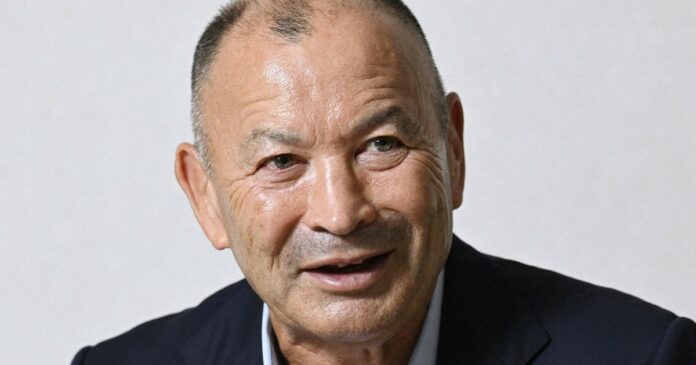
[ad_1]
Japan’s men’s national rugby team head coach Eddie Jones gives an interview in Tokyo on Sept. 27, 2024. (Kyodo)
TOKYO (Kyodo) — Having set the lofty goal of a top-four finish at the 2027 Rugby World Cup, Japan head coach Eddie Jones also wants to build the framework for the long-term future of the Brave Blossoms.
Since retaking the reins of Japanese rugby, the 64-year-old has set about constructing a squad who can not only compete at the tournament in three years’ time in Australia but at the following edition as well.
“My job is to win, 100 percent, but I came back to Japan because I want to build a base for Japan going forward,” Jones said in a recent interview with Kyodo News at the Japan Rugby Football Union headquarters in Tokyo.
With that target in mind, he has introduced 17 new caps during his seven tests in charge, as the Brave Blossoms look to bed in a “super-fast,” attack-based brand of Japanese rugby.
Those matches have resulted in three wins and four losses, most recently a 41-17 defeat to world No. 9 Fiji in the Pacific Nations Cup final, and Jones admits the 14th-ranked Brave Blossoms are currently “not good enough” to beat a top-10 opponent.
“In reality it’s been like that since 2019, so the next three years is about creating a team that can beat a top-10 team in the world,” said Jones, who wants Japan to “scare” opponents with their attack.
“That’s the type of team we want to be, because if they’re trying to stop us, they’re concentrating less on what they’re doing,” he said.
The Australian said several newcomers demonstrated they could handle test rugby and was particularly upbeat about the team’s “spine,” including hooker Mamoru Harada, No. 8 Faulua Makisi, scrumhalves Shinobu Fujiwara and Taiki Koyama and fullback Yoshitaka Yazaki.
“They’re all guys that previously hadn’t played for Japan and now all of them look like they’re capable of being longer-term players,” he said.
Jones raised some eyebrows with his initial selection of then 19-year-old Waseda University student Yazaki but says the youngster has already shown he’s a “special player.”
“He’s quickly developed the capacity to play test rugby because he’s special,” Jones said. “He learns quickly. You don’t have to tell him the same thing twice. The really good players, you never have to tell them something twice.”
The JRFU has begun working more closely with universities and the professional Japan Rugby League One to develop players, Jones said, with all levels “really receptive” to closer integration under the national body.
“We have been out to the universities consistently,” Jones said. “We’ve been visiting the League One sides and what we’ve been trying to do is just say, you’re part of the picture…so how can we work with you?”
A strong supporter of former Tokyo-based Super Rugby side Sunwolves, he hopes to eventually see another Japanese team join the Oceania competition, but says strengthening League One, which superseded the more corporate-oriented Top League in 2022, must take priority.
“Maybe three years down the track, when Super Rugby is due for a restructure, I think that’s the timing,” he said. “Then I think Japan should look seriously again at having a team in Super Rugby, so you’ve got that second tier and all of your young players are playing at a higher level.”
Japan will face their highest-ranked opponent of Jones’ current tenure in world No. 3 New Zealand at Yokohama’s Nissan Stadium on Oct. 26 before embarking on a European tour in November.
The architect of rugby’s biggest upset, the Brave Blossoms’ win against South Africa at the 2015 World Cup, says “everything is possible,” including another historic Japan victory, but it will “have to take one hell of an effort.”
Past skipper Michael Leitch aims to be back to face New Zealand after missing the Pacific Nations Cup but, according to Jones, he must first prove his fitness, along with World Cup veteran Kazuki Himeno.
“(They) had injuries they needed to rehab and if they’re fit when selection comes about…then we’ll make the decision about whether we add them to the team,” Jones said.
While Jones hopes to create the foundation of a team who will remain through the 2031 World Cup, he is adamant someone else will be in the coach’s box by then.
“(It’s) not for me. My job is until 2027,” he said.
[ad_2]
Copyright for syndicated content belongs to the linked Source link

